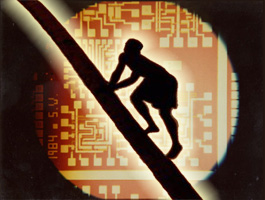No doubt at least a couple of people will be a little ticked off at me, since I kind of discouraged guest authors... but I warned everyone in advance about my hypocrisy in the
page... It's not my fault if you didn't read it. I gave you all fair warning. Anyway I reconsidered and I am going to make an allowance now and again... for a few select pieces which I believe fit into the scope of this site.
"World renowned" author, Sergio Patá, has given me permission to include the following short story in "The Random Times." I am truly honored to have this opportunity and I invite you to read and enjoy it. If you see what I saw while reading it, then you'll understand... LG
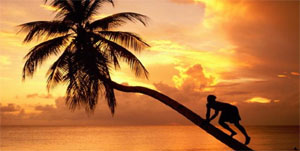

The Fiesta of Santa Udeba would be coming up soon. All of the young men on the island were extremely excited, because with the fiesta would come the "Competition." Winning the Competition was an honor on the tiny island of San Salicio. This year the village of Mantova de Santa Udeba would be the site of the Competition. It was simply a sporting competition, and no longer was it relevant as a way of life. But honor would come to the winning village and the winning village would also become home to the statue of San Salicio, the patron saint of the island, until the next Fiesta of Santa Udeba. Two young men (typically between 13 and 17 years of age) were chosen from all seven of the villages on the island -- from Rincón, Alicia, Agrigius, Jelena, San Jesus, Jiacinto as well as Mantova de Santa Udeba.
July 20th, Fiesta day was approaching and Tomás had been practicing for weeks in preparation for the Competition. Everyday he would go out and find a palm tree and he would slowly work his way up the tree. The Competition was a simple race between the villages, to see which village would achieve the honor of the win. The palms were climbable, because every year during the windy season the winds stripped them of their dead branches, leaving the trunks roughly textured. The Competition dated back to a time long before the missionaries arrived and brought with them new religious beliefs, customs and language. For some reason the missionaries allowed many island traditions to be incorporated into the new religion and customs that they imported from Europe. Perhaps the most significant inclusion was the Competition into the Fiesta.


The Lali & Mantova de Santa Udeba
The "Lali" (native peoples of the island) had learned many of the customs of the missionaries and themselves further adapted many of their ancient island traditions and customs into these more modern ways. The Lali all but abandoned their native language and integrated many of the words and phonetics into their unique version of Spanish. The missionaries even went so far as to allow the natives to rename some of the saints with island equivalents. Today the missionaries were led by Father Filomeno María who was not a native Spaniard, but was actually an Italian raised in Spain. He was a very friendly man of 50 and he was not very imposing. He had been chosen for this post precisely for his tolerant nature and his ability to understand non-European cultures. Though he was a foreigner to the island, the islanders respected him as he mutually respected them. The natives enjoyed listening to him speak Spanish, as his accent was more Italian than Spanish and to them seemed much closer to their own unique style of speaking Lali-Spanish.
Tomás was excited about the Competition, because his father was the most renowned winner in history. His father won the Competition six years in a row, before he hurt his leg and could no longer compete. Tomás was only 10 years old and was at least two years younger than most of the other competitors. Tomás was not the village elders' first choice -- in fact he was not even their second or third choice. It was Guillermo, Tomás' father who convinced them to use Tomás. Tomás was small for his age and his frame was not big-boned as so many of the other young men.
Guillermo was a very disciplined man and expected the same out of his son, but Tomás was a free thinker and was sometimes a bit of a daydreamer. He often dreamed of flying like a bird -- soaring to incredible heights, then swooshing down. Then he would fly back up to the mountain tops where he could look down on the world and take in all of its beauty and wonderful panoramas -- the trees, the sky, the beach with its crashing waves and the mountains cascading to the sea. Guillermo worried about his son's nature. He knew that life on the island for a Lali could only be one of fishing or pearl diving -- there wasn't any place for a dreamer in this all but isolated piece of land completely surrounded by ocean.
...to dream and to look for new ways...
Tomás' mother, Sanoma was not as practical as her husband and in many ways she encouraged Tomás to dream and to look for new ways. She was the daughter of Madeo Ubeba the village chief. She did not know a life of limitations or restriction. Her married life to Guillermo was much more humble. Guillermo was a proud man and was determined to be the sole provider for his family. Though he greatly respected his father-in-law, Madeo, Guillermo refused to accept anything but very small gifts from him, so Sanoma had learned ane entirely new way of life but she refused to accept any psychological limitations. Her son was very important to her and though she was not as zealous as her husband to draft him as a Competitor, she had belief in him.
When Guillermo convinced the elders to allow Tomás to represent the village he became the proudest man on the island. He was not only happy that his son would compete, but his goal was that his son would be the youngest winner of all time. This was an enormous amount of pressure for Tomás. Tomás feared that he would not live up to his father's expectations. He did not want to disappoint his father in any way. He did not fear his father. He loved his father enormously and wanted to see him happy -- indeed love was more motivation than fear could ever be. For Tomás anything less than a win was unacceptable. Tomás worked hard to become the best competitor possible but he realized that it would be very difficult to win.
Waninos?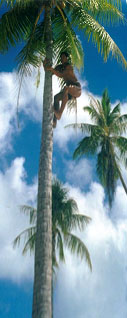

That afternoon Tomás' mother went to the village general store to buy some caupas – small loaves of sweet bread. She wore her favorite gold earrings. They were a gift from Guillermo many years ago and these were her prized possessions. Each earing was hoop-shaped and at the clasp was a tiny cherub. She nicknamed the earrings "waninos" an island word meaning twins. While she was at the store she noticed some new jewelry items. There was a pair of pearl earrings that caught her eye and she asked Komigo, the storekeeper to let her try them on. She took off her precious waninos and put them on the counter near the window. She tried on the pearl earrings and looked at them in the mirror on the wall. She thought about buying them and asked the price. She asked Komigo how much they cost and he told her 40 pesetas. "40 pesetas! That is more than Guillermo makes in two months". Komigo told her that he was sorry that they were so expensive but he said that was the lowest price that he could sell them for. "I cannot afford anything so expensive, so I will just be happy with my waninos." She took off the pearl earrings and turned to put on the waninos but they weren't where she left them. "Where are my earrings?" she asked Komigo. He said that he did not know. "I was standing by you the entire time and no one else entered the store." They looked all over the store for the earrings and they were no where to be found. Finally Sanoma had to leave to return home. She was very upset that she had lost the waninos.
When Tomás returned home he noticed how upset his mother was. He asked why and she told him. He was so sad to see his mother so unhappy...
The Statue of San Salicio and the Azula Bolino Stones
The next day he got up very early to practice for the Competition. The fiesta was still a week away. He passed by the village gathering place. The elders from all of the villages were there and they were busy getting the statue of San Salicio ready for the fiesta. The statue was three times the size of a human. San Salicio was the namesake of the island and his statue was a revered icon on the island. The elders from the villages had put their money together to buy two rare azula bolino stones to place in the eyes of the statue. Tomás could see the new absolutely radiant blue eyes of San Salicio. The stones were magnificent.
Tomás was going to visit La Punta a small sliver of the island that jutted out into the ocean. He was going there to climb the palm that everyone called "La Espina." La Espina was considered the second most difficult palm to climb on the island. Guillermo is the only person who had ever climbed La Espina. The only palm that was considered harder to climb than La Espina was near Mantova de Santa Udeba. It was called "El Diome de la Muerta." It had never been climbed. The last time that El Diome de la Muerta was used for the Competition was many years ago and that year one competitor fell and died and another fell and broke a knee. The survivor with the broken knee was Guillermo. After the tragedies, the Competition that year was ended and El Diome de la Muerta was not used again for the Competition.
Tomás looked at La Espina and began to climb. He made it about half way up and then suddenly began to get tired. He felt his small hands losing grip in the crevices of the palm's trunk. He was forced to descend before he fell.
Tomás began his walk back home. As he returned to the village he passed the statue of San Salicio. There was a large crowd around the statue and he heard some shouting. As he moved closer and he could now make out what was being said. He could hear the elders from the nearby villages accusing the elders of Mantova de Santa Udeba of stealing... Then he looked up at the statue -- the beautiful eyes were gone. The azula bolino stones were not there. There were many bitter sounds coming from the elders and many others. Everyone was hurling accusations at the elders of Mantova de Santa Udeba. Just at the moment when the angry elders were ready to begin fighting Father Filomeno María pushed his way through the crowd. He immediately stepped between Madeo Ubeba and Joachim Juarez an elder from Rincón. It was at this time that another elder exclaimed that his wristwatch is missing. More accusations followed and Father Filomeno María had to step in. He finally broke up all of the commotion and calmed everyone. He said that somehow everything would right itself. He thoroughly believed in the honesty of these villagers.
Discouragement and Despair
Tomás went home in despair for his village. All of the visiting elders were quite unhappy and believed that thieves lived in Tomás' village. The next days Tomás practiced for the Competition. Though he could make it up most of the palms that he practiced on. He was not very fast. He didn't know how he could possibly beat the others. With all of the events that had taken place over the last few days the Competitors from the other villages would even be more motivated to beat Mantova de Santa Udeba.
Tomás was very discouraged and almost wanted to pretend to be sick to avoid public humiliation. "How can I possibly beat all of these Competitors? They are bigger, stronger and have larger hands than me." He went to talk to his mother… he told her, "Mama I don't want to enter the Competition… Everyone is so much better than me." Sanoma bent down and looked into her son's eyes..."Tomás… I love you very much -- I know that you are a dreamer and when you are a dreamer nothing is impossible. I will not force you to compete but I am sure that no matter how big or strong the other Competitors are, you will find a way to do well. If you want to compete then I stand behind you and if you choose not to compete I will stand behind you." "But what about Papa? He will be very disappointed"... Tomás said. Sanoma responded by saying… "It is true that your father expects you to compete and he feels very strongly about your ability to win. I do not understand how to climb palms but he does... Perhaps he sees something in you that you have not discovered yet..."
July 20th was tomorrow. Tomás spent most of the day preparing for the Competition. It was late and he had gone to bed but he was having difficulty sleeping. He thought about the Competition and how difficult it would be for him to win. He thought about how great a Competitor his father had been and feared letting him down. He was thinking about La Espina and he hoped that they would not choose that tree for him to climb. Finally he began dreaming of flying and he was soaring with the birds... He was sleeping.
The Competition
Tomás woke early on Fiesta morning. He immediately started thinking about the Competition. He was enjoying the Fiesta. The marching band played and the villagers carried the statue of San Salicio throughout the village. The statue did not have the beautiful Azula Bolino stone eyes. Instead they had been replaced with a pair blue beads. The statue was still beautiful despite the replacement eyes. In an hour the Competition would begin.
At 4PM all of the Competitors would gather at the town gathering place. There would be two baskets. In one basket would be numbers to determine the order of the Competitors. In the other would be the name of various palm trees near Mantova de Santa Udeba. The lottery began. Each of the Competitors walked up to the order basket and selected a slip of paper. Each of the Competitors unfolded their slip of paper. Tomás looked at his number -- it was #14. He would be last. He felt a little better but then he realized that as the last Competitor he would be expected to beat the others now not just have a good showing.
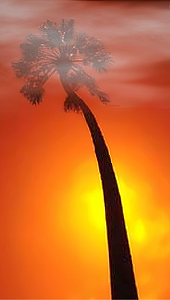

El Diome de la Muerta
The tree basket was now brought out and Father Filomeno Maria reached in and pulled out the folded slip of paper. He unfolded the slip and read it out loud..."El Diome de la Muerta." The crowd gasped. The crowd quickly dispersed and gathered at the base of El Diome de la Muerta. Tomás looked at El Diome de la Muerta and became very nervous. The first Competitor -- Alfredo Diaz stepped up to the tree and grabbed on and started to climb. He got about ten feet off the ground and suddenly lost his grip and fell to the ground. He was not hurt but now Tomás actually began to sweat fear. The Competitor from Rincón walked up to El Diome and grabbed on. His name was Deogracias Colonzo and was very well known throughout the island. He was 14 years old and won last year's event. Deogracias Colonzo climbed very rapidly and as he reached about 15 feet he suddenly lost his grip and suddenly started sliding down the tree. He fought to keep his fingers in the rough trunk, but by the time he reached the bottom his hands and his chest were bleeding. The local doctor started to treat him immediately. He began squeezing aloe vera leaves on his wounds. The aloe vera juice was an ancient remedy for open wounds. Western doctors recognized its antibiotic properties and found it to be a quite useful and abundant medicine on the islands.
Each of the Competitors suffered similar results. Now it was Tomás' turn. No one even made it a quarter up the tree. Tomás was more scared than ever but he stepped forward. He heard some of the others snicker at his size.
Tomás took a big gulp to summon all of his courage and strength. He approached El Diome de la Muerta. He thought about what this tree had done to his father so many years ago. He thought about the young man who died... He cleared his head and grabbed onto the tree. He was very determined to at least get to the 10 foot level. As he climbed he suddenly noticed that this tree was not so hard to climb. Then he realized that his fingers comfortably fit into the tiny crevices of the trunk. His hands were smaller than the other Competitors and that's why the others couldn't keep their grip. The trunk was too thin for their hands but it was perfect for Tomás. The crowd was now cheering. He finally realized that he could make it to the top of El Diome de la Muerta. He kept climbing. El Diome de la Muerta was the tallest Palm on the island. He had never been this high up on a Palm before. El Diome de la Muerta was swaying in the gentle wind but because the tree was so tall the swaying was several feet in both directions. Then all of the sudden large black birds started to swarm around Tomás. They were crows but they were the largest crows that he had ever seen and they were mad. The crowd gasped. The crows were diving at Tomás and they were becoming more fierce with each inch that he ascended. They started to peck at him. His father Guillermo was yelling at him to come down. The crows were trying to knock him down. Tomás couldn't understand why they were so aggressive -- then he saw it. At the top of El Diome de la Muerta, he could see a large nest. It must be the crows' nest. Tomás thought about descending El Diome de la Muerta. Surely he would win the Competition, since he had gone much higher, than any of the other Competitors. Then he saw it -- something in the nest seemed to be reflecting the sunlight. He decided to continue climbing. He struggled every inch -- swatting at the crows while making his slow ascent. He finally made it to the top and into the nest. There were no eggs in this nest, but it was huge. Large enough for Tomás to lay down. He tumbled into the nest and suddenly the crows ceased their attack.
...higher than he had ever been...
He looked out over the edge of the nest. The tree swayed and it was as if he was flying just like in his dreams. He was higher than he had ever been before. It continued to sway from side to side but Tomás enjoyed his ride for now he truly was like the birds. He could see the entire island from his crows' nest. He began looking around the nest. He looked at the object that had been glowing -- it was bright blue -- it was an azula bolino stone just like the ones he saw in the statue. Then he saw the other stone. The whole nest was glimmering. Everywhere that Tomás looked there were precious objects. There was a beautiful gold watch. There were necklaces, rings and bracelets. There were pins and tie-tacks and bits of shiny metal and glass all over -- jewelry of all kinds.
The items in this nest couldn't be from just this island. There were thousands of small items and dozens of larger ones. Then he saw them --the "waninos." He grabbed them. All he could think about was how important they were to his mother. He called down to his father and told him what he found. Guillermo and some other villagers ran to get some baskets and nets so that Tomás could drop the
items to them. Then Tomás started throwing handfuls of items from the nest. Everyone stood back as the precious items literally fell from the sky. A silver goblet, marbles, rubies, diamonds, golden necklaces, rings, bracelets, watches. Madeo Ubeba quickly plucked a watch from the net and handed it to the Jelena elder, Pablo Pachez. He hugged Madeo as his apology.
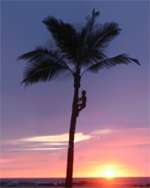

Tears streamed down her cheek...
The rain of riches went on for two hours. By the time that Tomás finished emptying the nest he was exhausted. He slowly let himself over the side and gained his grip. Inch by inch he descended. When he reached the bottom a huge cheer came from the crowd and they quickly lifted him into the air and carried him to the stage where the lottery began. His mother and father hugged him and he took his mother's hands and placed two objects in them and closed them. When she opened her hands -- there they were -- the "waninos." Tears streamed down her cheek. Tomás had won the Competition. He conquered his fears. He brought honor to his village. His parents were proud. So many good things resulted from the Competition that year... a young dreamer...reached incredible heights and soared with the birds...
This story was inspired by and is dedicated to Tomás – the "Conquerer of the Palm"… Sergio Patá
©1998 Sergio Patá & FG International Publishing
